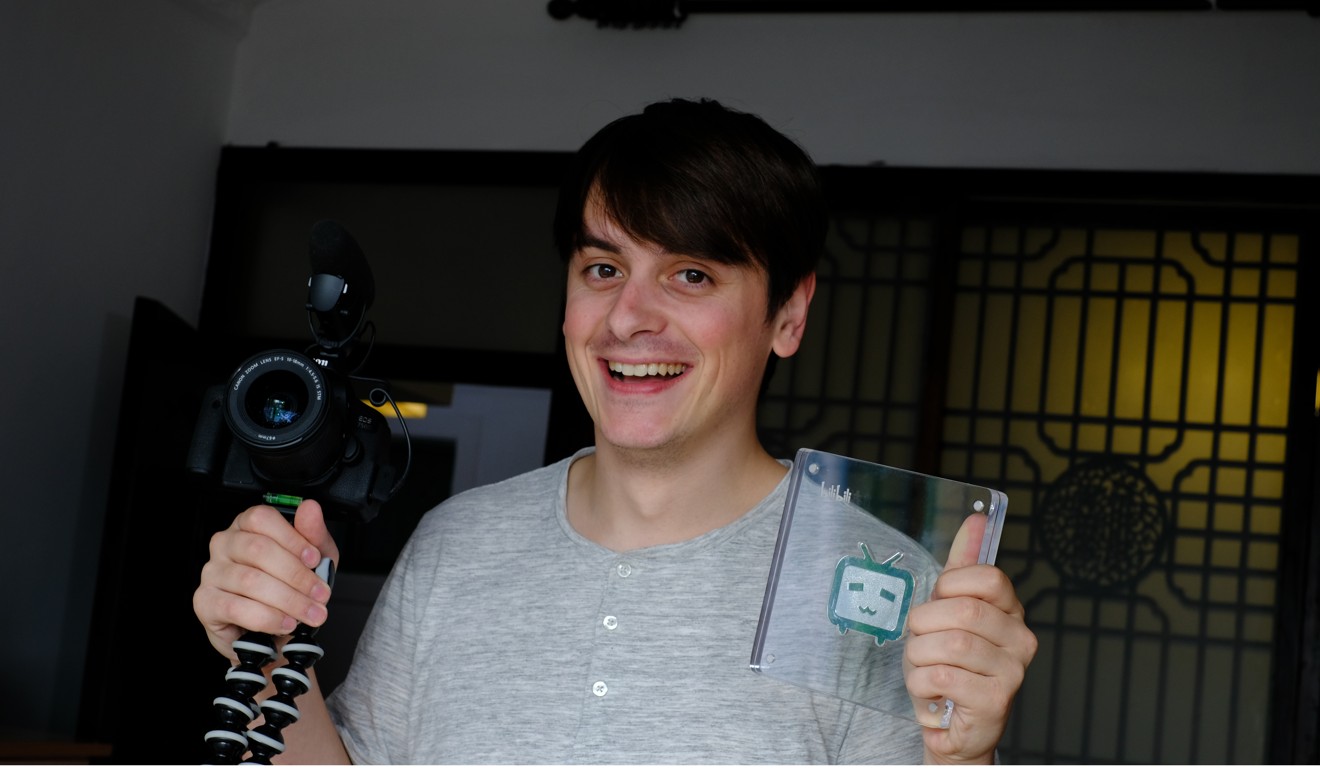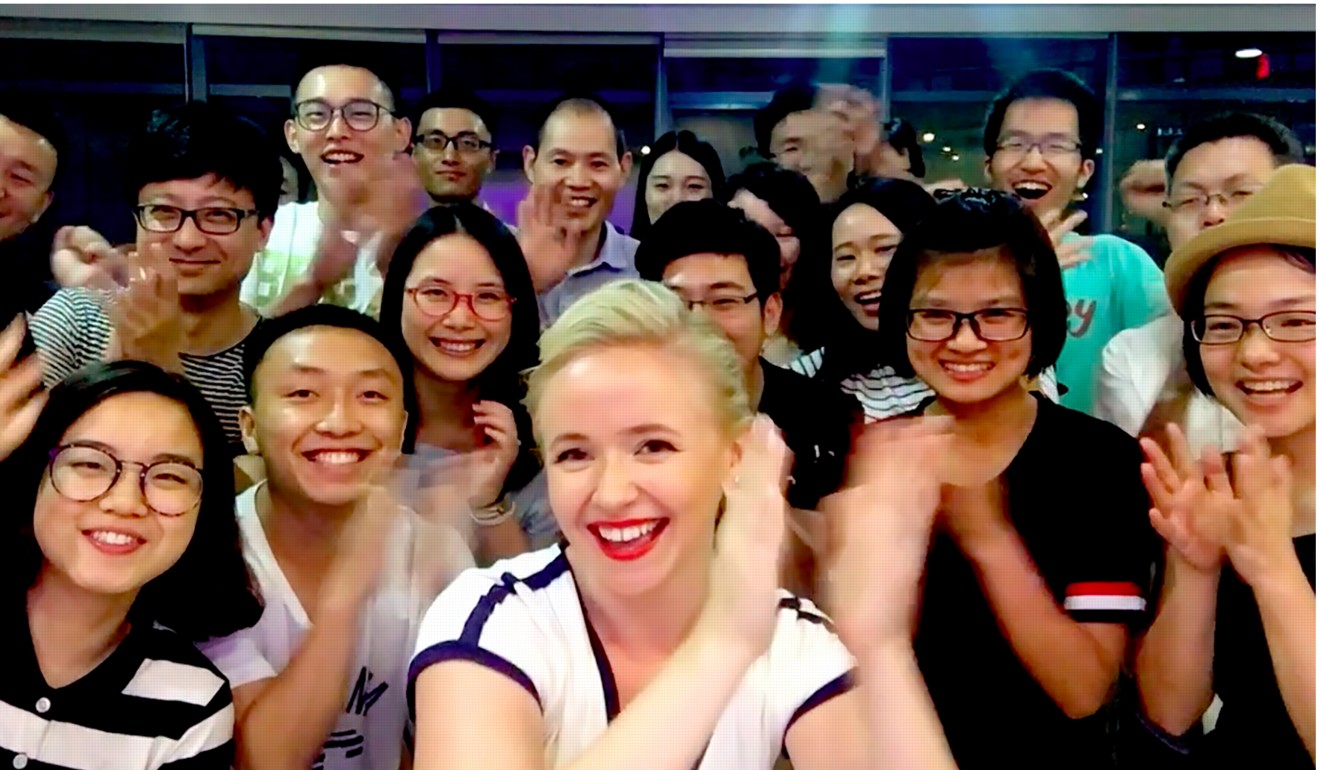Great call of China: how foreign video bloggers are becoming the ones to watch
Mandarin speakers making a name for themselves with light-hearted videos on language, food and travel

They hail from as far afield as Britain, Europe, the United States and Japan, but Fu Lin Fang, Bai Jie, Wang Ba Dan, Gang Dan and Yamashita Tomohiro have one thing in common – for those who watch online videos in China they are all household names.
And with the exception of Tomohiro from Japan, all of these foreign bloggers have taken on Chinese monikers. They speak fluent Mandarin and make videos on topics ranging from foreign-language learning and cross-cultural differences to food, travel and comedy, which they post on social media platforms in China.
Just as tens of thousands of young Chinese have been drawn to the booming video blogging business, a growing number of foreigners living in China – or elsewhere – are now trying their hand at it.
Video blogging is seen by many as a potentially lucrative career path, since those with a large fan base can often use their fame to make money.
According to a report released by Beijing-based consultancy iResearch in June, the number of online celebrities in China with more than 100,000 followers increased this year by 57.3 per cent from 2016. The report did not give the total number of online celebrities on the mainland. Some 470 million internet users were following these online celebrities, up 20.6 per cent from the previous year.
Of those fans, 54.1 per cent lived in third- or fourth-tier cities, and 65.7 per cent sought out videos with humorous and fun content.
British video blogger William August is known as Fu Lin Fang in China, where he has three million followers. His short videos about English study, British and Chinese culture and social trends appear on YouTube as well as eight Chinese video websites.

His Chinese fans affectionately call him Fang Fang, based on the last character of his Chinese name. That nickname is generally reserved for girls, but August said he liked the name because “it’s cute”.
The 26-year-old also receives plenty of comments on his looks – some say he could pass for a Uygur, the Turkic minority from the country’s far western Xinjiang region, while others tease him about his hair. August said none of this bothered him and he often made self-deprecating jokes about his own appearance.
“I don’t get offended. In this industry, it’s very good because if you are video creator in China, you will get a lot of abuse just for the way you look,” he told the South China Morning Post. “For me, it does not bother me.”
August graduated from Sun Yat-sen University in Guangzhou two years ago, majoring in business-related Chinese language. He was hired by telecoms equipment giant Huawei as a supply chain project coordinator in England, and in his spare time he began making videos to teach his Chinese friends English. His videos were posted on the WeChat social media app and on video-sharing website Bilibili.
He did not put much effort into production and distribution yet rapidly amassed followers, and before long he was able to quit his day job. Now he is a full-time video blogger targeting the Chinese audience.
“My fans like me because of my personality. I am a down-to-earth person and I am not acting,” he said.
August moved back to China several months ago and plans to set up a Chinese-language video production team in Shanghai.
Another foreign blogger who has made a name for herself in China is Bai Jie – also known as Jessica Beinecke. The 30-year-old American has been making daily two-minute bilingual videos since 2011, aimed at teaching US slang and culture to Chinese.
“A lot of Chinese millennials have learned a lot of conversational English from my videos over the past five to six years,” she said.

Beinecke also live-streams episodes from her everyday life in New York for the Chinese audience.
A month ago she began targeting the many middle-class Chinese who travel to the United States with a series called “I Know This Spot”. In the one-minute videos, Beinecke visits 10 places in a US city, introducing colloquial English terms that can be used by Chinese when they travel.
“My goal is to consistently produce content my audience requests,” said Beinecke, adding that her videos have been watched more than 100 million times this year. In the past month, her travel videos have been viewed 6.5 million times.
Both August and Beinecke produce videos on their own. “I taught myself everything, like shooting and editing,” Beinecke said. “I write the content, host, produce, shoot, edit and post [on social media] all by myself.”
She said that unlike foreign audiences, Chinese tended to prefer to watch shorter videos – of just a couple of minutes – rather than longer ones.
But finding the time to create content was her main challenge. “I wish I had more time to make more videos,” she said.
The problem was shared by August, who said he worked long hours every day to produce his videos.
Both of them are making a living from their videos by working with brands.
Other popular foreign video bloggers include Wang Ba Dan, an American who lives in the coastal city of Xiamen in Fujian, from where he makes English-language learning and light-hearted videos.
Martina Huang Feifei from Italy, Frenchman Quentin Gang Dan, and Tomohiro from Japan also have large followings for their entertaining videos in Mandarin.
Canadian Trevor James, who bills himself as the “foreign foodie” – Chihuo Laowai – is also a hit on social media. Based in Chengdu, his videos show him travelling around trying food across China and other places in Asia.
“As a Chengdu native, I think this guy has broader and deeper knowledge of Chengdu food than me,” one internet user said of James.
Cao Sanxing, deputy dean of the New Media Institute at the Communication University of China in Beijing, said internet users craved variety, noting that there had previously been a lack of video bloggers with international and cross-cultural backgrounds in China.
But Cao also warned foreigners hoping to jump on the bandwagon that there were strict rules governing video content in China.
“Since their videos are broadcast in China, foreign bloggers need to be mindful of China’s laws and remember that their content is also subject to regulations here,” Cao said.
YouTube is one of a number of websites blocked in China, where censorship and internet controls have been tightened under President Xi Jinping.

August said he was aware of Beijing’s media censorship but it did not affect his videos because they were mainly for entertainment and did not touch on sensitive topics.
As for the competition from other foreign video bloggers, he said he was not worried.
“I don’t have any pressure in this regard. On the contrary, the more people who create content, the better for the industry,” he said.